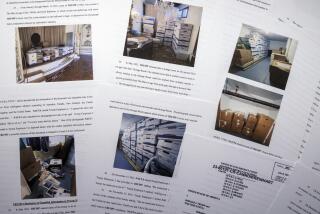Judge Is First Federal Jurist Convicted of Taking Bribe
- Share via
NEW ORLEANS — U.S. District Judge Robert F. Collins was convicted Saturday of scheming to split a $100,000 bribe from a drug smuggler, making him the first federal judge in the 200-year history of the judiciary to be found guilty of taking a bribe.
Collins, who was caught with $16,500 in FBI-marked money, was the first black to be named to a federal judgeship in the Deep South. He and the alleged bagman, John Ross, a politically connected businessman, were found guilty of bribery, conspiracy and obstruction of justice.
Both face up to 25 years in prison and $750,000 in fines. Sentencing was set for Sept. 6. Defense attorneys said appeals were likely.
Collins was the first federal judge convicted of any crime since Robert P. Aguilar of California was found guilty of illegally disclosing a wiretap in August, 1990. Three other federal judges were indicted during the last decade and removed by Congress. They were Harry E. Claiborne of Nevada, Alcee L. Hastings of Florida and Walter L. Nixon Jr. of Mississippi.
Hastings, who also is black, visited Collins during the trial. Hastings was acquitted of conspiring to take a bribe, but still was removed from office.
According to the Justice Department, no federal judge before now has been convicted of bribery.
Julian Murray, Collins’ attorney, said the judge was too upset to comment.
“Right now, he’s unable to handle it,” Murray said. “He’s in a state of mind of incredulity. He’s in a state of shock.”
Murray said Collins would not resign, but would not hear cases until his appeal was over. A federal judge can be removed only through impeachment by Congress. Collins will continue to receive his salary.
Lawyers for Collins, 60, and Ross, 59, contended after the trial that both were singled out for prosecution because they are black. The contention was not brought up during the trial.
Ross, who testified that Collins knew nothing of any bribery scheme, said he was devastated by the verdict and planned to give up his posts on the city’s levee and aviation boards, although he maintained his innocence.
Ross criticized the government for using a convicted drug smuggler as an undercover informant.
“Is that a good example for our children?” Ross asked.
The case centered on Gary Young, a convicted drug smuggler who turned informant. He told authorities in September, 1989, that Ross had approached him about a bribe.
Young gave Ross $100,000 in FBI-marked money during late 1989 and 1990. Most of the cash was recovered Aug. 10 from Ross’ safe deposit box and office, but $16,500 was found in Collins’ office and wallet.
In all, about $88,000 was recovered. The remaining $12,000 was not found.
Ross testified that Young was just passing on money from John Yemelos, who owned a restaurant managed by Young and wanted to invest in a minority business that Ross was starting. Ross said he gave $16,500 to Collins as a down payment on a house.
During closing arguments, defense attorneys said Young invented the scheme and entrapped Ross to get leniency for his own legal problems.
But prosecutors said that Young’s testimony was backed by the evidence, including more than six hours of taped conversations and wiretapped telephone calls as well as the marked money.
The jury returned the verdict after 9 1/2 hours of deliberations over two days. Before retiring Friday night, it had asked to hear about 700 pages of key testimony, leading attorneys to speculate about lengthy negotiations. But the verdict came in after only two hours of talks Saturday.
Jurors were escorted out a back door by marshals and did not talk to news reporters.
James Cole, a prosecutor in the Public Integrity Section of the Justice Department, said allegations of crooked dealings within the judiciary “are a rare occurrence. When it happens, juries react very strongly.”
Cole called the conviction “a very bittersweet moment for me. I work in the courts and have to trust the integrity of the courts. I don’t like to see any corruption in the federal courts.”
More to Read
Sign up for Essential California
The most important California stories and recommendations in your inbox every morning.
You may occasionally receive promotional content from the Los Angeles Times.













